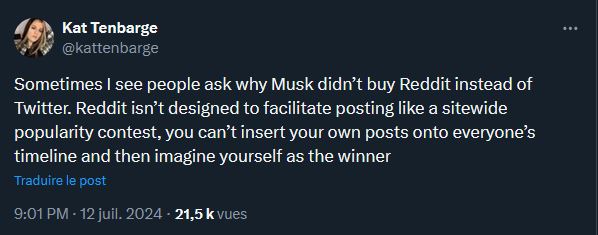12 years ago, the first film was released Avengers. Tony Stark’s character was portrayed as an insufferable but funny entrepreneur. In 2024, it’s hard not to see an echo of the very real men who inspired him. This is the theme of Lucie Ronfaut’s Rule 30 newsletter this week.
This weekend, overcome by a slightly morbid nostalgia, I rewatched The Avengers. I have fond memories of the film’s release in 2012. At the time, I was finishing a year of university exchange in the United States. I enjoyed the spectacle on the big screen as much as the sweet melancholy of sharing an XXL bag of popcorn with friends that I would, for the most part, never see again.
Finally, even older and from my sofa less comfortable than a cinema seat, The Avengers remains an entertaining film. The dialogues are funny, the action scenes well-crafted, the heroes sufficiently developed to make us care about them. But I still noticed a change. Today, Tony Stark makes me deeply uncomfortable.
This editorial is taken from the newsletter Règle 30 by Lucie Ronfaut, sent every Wednesday at 11am. To subscribe:
This was not the case in 2012. Tony Stark/Iron Man (played by actor Robert Downey Jr.) is the keystone of the beginning of the Marvel universe in cinema, and a character much loved by viewers. First presented as a pretentious and rude entrepreneur, he then becomes… a pretentious and rude entrepreneur, yet capable of leading his team of superheroes to save humanity with courage and self-sacrifice. This was more or less the classic representation of digital entrepreneurs in 2010s fiction: misunderstood, antisocial geniuses, nevertheless potential heroes. Like everyone else, I found Tony Stark unbearable, but amusing. I believed Iron Man’s lies.

I have always been interested in how fiction looks at the digital industry and its players. Because it reflects the evolution of our hopes and our anxieties about technologybut also because it (often) tells a different story from the one built by entrepreneurs. When Jeff Bezos or Mark Zuckerberg show off their bulging muscles, it is not only out of love for hyper-virilism, but also to counter the image of the disturbing little nerd that has long been popular in our minds. When Elon Musk buys Twitter/X, he puts himself at the center of conversations and media attention, to better direct it towards the subjects that obsess him. Entrepreneurs even manage to re-appropriate the most dystopian fictionsby emptying them of their political messages and promising us to be, like them, the heroes of a necessarily high-tech future.
I can’t find Tony Stark funny today.
In 2022, one of the writers of the first Iron Man film (2008) explained that he had drawn from various personalities in the industrial world to bring Tony Stark to life: Steve Jobs (who would die three years later), Donald Trump (who was not yet a politician) and Elon Musk. In the cinema, we saw Tony Stark learn from his mistakes, open up to others, become a good person, according to the typical and slightly retrograde scale of values of an action film (a good patriot, a good husband, a good surrogate father). In real life, Elon Musk called this weekend to vote for Donald Trump (he promised to help his campaign financially at a rate of $45 million per month) and accused the US Secret Service of hiring too many women following the attempted assassination of the US presidential candidate. He was followed by several Silicon Valley and venture capitalist figures who declared their support for the far-right politician. On Monday, Trump also announced the identity of his running mate: This is Senator JD Vancea former protégé of tech billionaire Peter Thiel.
For all these reasons, it is impossible for me to find Tony Stark funny today. He is not just a fictional character. He is the disturbing echo of very real men and their sinister trajectory in our History, the real one. It is easier to pose as a hero than to accept that one is a super-villain.


Source: www.numerama.com


